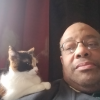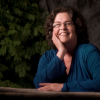Home » Jazz Articles » Album Review » Diane Moser: Birdsongs
Diane Moser: Birdsongs
Many of these pieces start out as twittery, piping bird imitations but eventually morph into solid jazz rhythms. "Birdsongs for Eric" is dedicated to Dolphy and has Moser, flautist Anton Denner and bassist Ken Filiano engaging in a fluttery tangle before Moser shifts into a harder rhythmic vamp, rocking and prancing like McCoy Tyner and leading Denner and Filiano into serious swinging. The next three compositions are inspired by the songs of specific birds. "Hello," from the song of the black-capped chickadee, chimes and toots randomly before resolving into a formal and melancholy melody on flute with trilling support by piano and bass. Similarly "Dancin' With The Sparrows" is a flurry of hammered piano and piccolo notes that congeal into a theme with Japanese folk influence. "If You'll Call Me," inspired by the song of the robin, is jazzy from the beginning with Denner and Moser playing a prancing, boppish figure together before going into semi-abstract, blues-accented riffs over Filiano's solid walking bass. The more generally inspired "Won't You Come Out" starts with delicate call and response between Moser and Denner and leads the flute blowing smeary, low down lines over gently rocking piano and bass.
"The (Un)Common Loon," written by Kyle Pederson, a student of Moser's, is about the day in the life of a Common Loon, but its slowly expanding progression, powered by Filiano's bass, makes it seem like a smaller scale cousin to "A Love Supreme" and similar spiritual jazz works . Moser's easy swinging piano has a quiet power here reminiscent of the later music of Mary Lou Williams.
The final group of tunes is played solely by Moser. The Amy Beach composition "A Hermit Thrush At Eve" is put through careful, surging variations with an air of romantic mystery that slowly develop into a luxurious tango with a jazzy undercurrent. "Folksong" carves out a melody of crystalline single notes and "When Birds Dream" ends things with high, brittle chords seemingly suspended in mid-air.
Both the trio and solo tracks here really shine. The solo work spotlights Moser's gentle, flowing piano touch and the trio pieces show off the warm individual virtuosity of Denner and Filiano and how good the three musicians sound together. This CD shows how the sounds of nature can inspire improvisation and be shaped into music of remarkable beauty. It is highly recommended.
Track Listing
Birdsongs for Eric; Hello; Dancin’ With The Sparrows; If You’ll Call Me, Then I’ll Call You; Won’t You Come Out To Play; The (Un)Common Loon; Variations On A Hermit Thrush At Eve; Folksong; When Birds Dream.
Personnel
Diane Moser
pianoDiane Moser: piano; Anton Denner: flute, piccolo; Ken Filiano: contrabass.
Album information
Title: Birdsongs | Year Released: 2018 | Record Label: Planet Arts Records
< Previous
Again
Next >
Those Were the Days
Comments
Tags
For the Love of Jazz
 All About Jazz has been a pillar of jazz since 1995, championing it as an art form and, more importantly, supporting the musicians who create it. Our enduring commitment has made "AAJ" one of the most culturally important websites of its kind, read by hundreds of thousands of fans, musicians and industry figures every month.
All About Jazz has been a pillar of jazz since 1995, championing it as an art form and, more importantly, supporting the musicians who create it. Our enduring commitment has made "AAJ" one of the most culturally important websites of its kind, read by hundreds of thousands of fans, musicians and industry figures every month.




















